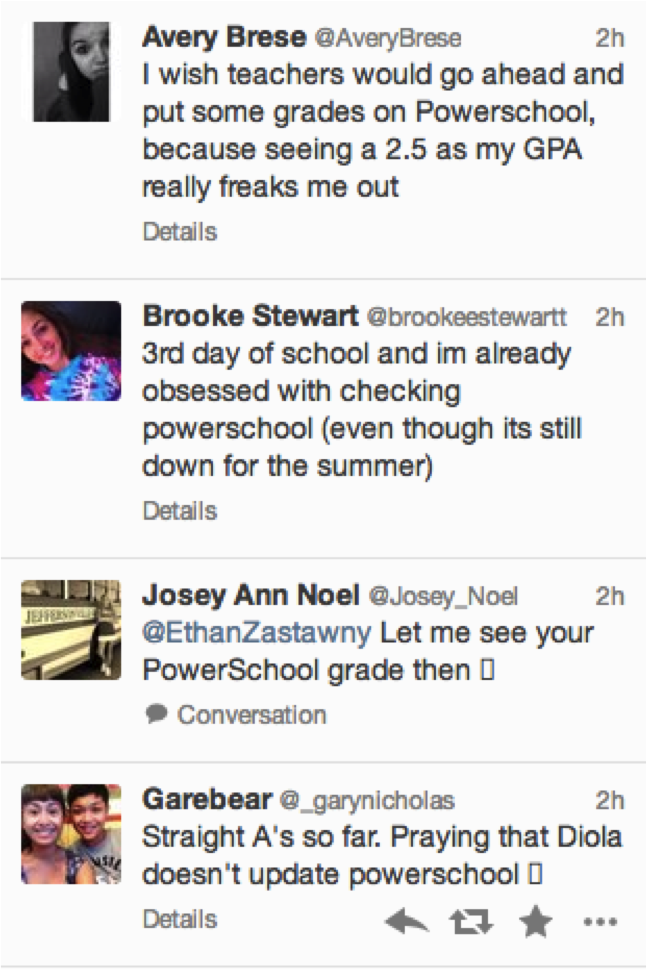I Will Not Check My Son's Grades Online Five Times a Day
More and more schools are adopting student information software, allowing millions of parents to monitor their kids' attendance and academic progress. But should they?
![[IMAGE DESCRIPTION]](https://cdn.theatlantic.com/assets/media/img/posts/Lahey_OnlineGrades_Post.jpg)
Last week I received a letter from my son's high school that started like this:
Dear Parent/Guardian,
PowerSchool, our student information system, allows you to create your own account and use a single password to access information for all of your children who attend school in our district. This account allows you to keep up to date with your students' academic progress, attendance, historical grades, etc.
I believe the letter goes on to detail procedures for setting up an account that would allow me to track nearly every aspect of my son's academic life. I say, "I believe," because I have not read the rest of the letter. Our family had known the letter was coming, and we'd already discussed how we were going to handle it.
My husband and I handed the letter over to my 14-year-old son with the promise that we will not be using the system to check on his grades or attendance (or anything else). In return, he promised to use the system himself and keep us apprised of anything we need to know.
We're not the only family that's had to decide what to do with "student information systems." According to Bryan Macdonald, senior vice president of PowerSchool, 70 to 80 percent of the schools that use PowerSchool choose to implement the parent portal, which represents about 9 to 10 million students. "Our best data suggests that over 80 percent of parents and students who have access - meaning their school has enabled remote access - use the system at least once a week...and many users check multiple times a day."
When I posted a challenge on Facebook encouraging friends to join us in eschewing PowerSchool, I received many comments and emails, none of them neutral. Either PowerSchool and its ilk are best thing that's ever happened to parenting or the worst invention for helicopter parents since the toddler leash.
Several parents reject the technology on the grounds that they want to talk to their kids face-to-face about school:
I am fairly certain that the fear of facing me with bad academic news was the only thing that kept my kids in line. Take away that moment when they have to look us in the eye, admit to not having studied and the ensuing results....not on your life! -Lisa Endlich Heffernan, mother of three and parenting blogger at Grown & Flown
We don't use the info, either. We just talk to our kids. -Elena Marshall, mother of eight
Teachers and administrators have mixed feelings:
I like that parents can check grades and I encouraged them to do so. I feel that open communication between home and school is essential in educating children, and only sending midterm and final grades home makes grades seem like a big secret. With parent access on PowerSchool, there are no secrets. I am bothered, however, by parents who CONSTANTLY check...sometimes 5 or 6 times a day. These parents tend to be the ones who push their children the hardest and are the first to complain when grades aren't entered on the DAY an assignment is due. As a language arts teacher with 60 papers to grade, I just can't do that! I'm not sure parents realize the school can see how many times they access the portal. -Mindi Rench, mother of two and junior high literacy coach and education blogger
Teacher Gina Parnaby tweeted that PowerSchool is a "Bane. Stresses my students out to no end. Freaks parents out b/c they see grades not as a communication but as judgment." Teacher Dana Salvador wrote in an email that i-Parent, the parent portal her school has implemented is a moot issue for her. This is not because the parents have not chosen to use the software, but the parents of her low-income, ESL students don't speak English and there is no Spanish version of the software.
For a sampling of what students think about PowerSchool, one need look no far than Twitter.

Ultimately, for many, including mother and teacher Christiana Whittington, the choice to use the unfettered access depends on the child.
I think this may be best viewed as a case-by-case scenario. Our son sailed through school effortlessly with excellent grades but hit one very hard. He procrastinated telling us about his issues. By the time we found out that he was struggling, it was really too late to save him. If we had had the opportunity to check on his grades through the portal, we could have easily prevented this. Our other daughter, being dyslexic, has always struggled in school. She had not yet come to grips with the fact that she is a bright person in spite of her disability and was embarrassed about lower grades especially in the highly competitive environment. For her, we would definitely have chosen to access the portal. I think overall this is a good thing but it can also completely undermine trust between parent and child. You really need to know your child.
For the time being, I choose to trust in the power of open communication and my son's emerging sense of responsibility and character. When I handed him the envelope, and asked him to keep me in the loop, he thanked me and returned to his room to do his homework. He has four years of high school ahead of him, and only time will tell if my faith in him is warranted. Until then, I plan to keep my hands out of what should be his business, his responsibility, and his life.


